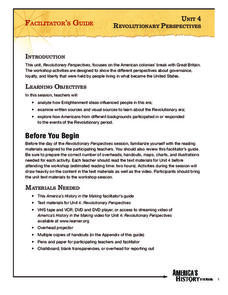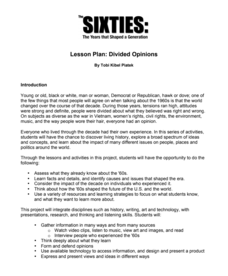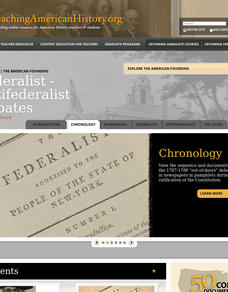Benjamin Franklin Tercentenary
Benjamin Franklin: Master Diplomat for One Last Time
At 81, Benjamin Franklin was the oldest delegate to the 1787 Constitutional Convention, where he exercised significant influence in shaping key elements of how the United States operates. The class examines his role, using “The Scene at...
Benjamin Franklin Tercentenary
Franklin’s Philadelphia: Another Point of View
The impressive story of Benjamin Franklin, including his rise from a printer’s apprentice to a statesman, color upper-level scholars’ understanding of the possibilities of life in colonial Philadelphia. But not everyone had the...
Benjamin Franklin Tercentenary
Ingenious: Franklin Assembles a Scientific Community
Few Americans have heard of the burgeoning scientific community known as the America Philosophical society, started by none other than Benjamin Franklin. With inquiry, research, and discussion, high schoolers come to understand their...
Benjamin Franklin Tercentenary
The Autobiography of Benjamin Franklin
Need a model for character education? Benjamin Franklin presents himself as in a constant state of striving to become the man he hoped to be, making his autobiography is far more accessible to learners than those of people who consider...
Jazz Academy
Let Freedom Swing
Three lessons in the Let Freedom Swing concert tour resource guide packed with information, materials, and activities that provide the context for any study of American history.
US House of Representatives
A Picture Is Worth a Thousand Words
As part of a study of women in Congress, groups analyze historical photographs associated with women's history and with women senators and representatives.
US House of Representatives
Objects in Time
What is the role artifacts play in the study of past events and people? As part of an examination of the careers and contributions of women in Congress from 1917 to 2006, groups examine artifacts that symbolize each woman.
US House of Representatives
Traditionalist, Feminist, and the New Face of Women in Congress, 1955–1976
As part of a study of women in Congress, class members read the contextual essay, "A Changing of the Guard; Traditionalist, Feminist, and the New Face of Women in Congress, 1955–1976." Groups then research a woman serving during this...
US House of Representatives
Congresswomen in an Age of National Crises, 1935–1954
Class members investigate congresswomen and the role these senators and representatives played in congress during the period from 1935–1954.
Annenberg Foundation
Antebellum Reform
Scholars investigate the Antebellum period in the United States in an engaging lesson. Groups analyze technological, religious, economic, and social changes occurring during the time period prior to the Civil War. Using their new...
Annenberg Foundation
Revolutionary Perspectives
Life, liberty, and the pursuit of happiness. Learners go to the heart of the causes of the American Revolution. Examining political cartoons, Enlightenment documents, and firsthand accounts, they present their ideas and reflective...
Annenberg Foundation
Colonial Designs
The adventures of the New World came at a cost for Native Americans. Scholars investigate the economic side of settling the European colonies. Using video clips, statistical evidence, and primary sources, they create hypotheses and...
PBS
Using Primary Sources: Wide Open Town
A picture speaks a thousand words, no matter how old! Scholars use political cartoons from the era of Prohibition and the Temperance Movement to analyze what, a primary document (in this case, a bootlegger's notebook) is telling them...
Benjamin Franklin Tercentenary
Designing Benjamin Franklin: In Search of a Better World
How do you convey someone’s creativity? Individuals answer the question as they design exhibitions to showcase the intellect and genius of Benjamin Franklin. After conducting research, classmates work in groups to try to capture and...
Benjamin Franklin Tercentenary
Reading the Work of B. Franklin, Printer
Placing Ben Franklin’s ideas about a free press next to those embodied in the First Amendment sheds light on both. Learners interpret and compare two primary sources and then examine them in the light of a contemporary survey about...
New York State Education Department
US History and Government Examination: August 2015
Are your learners feeling a bit jittery about an upcoming American history standardized test? Take a look at a state standardized test to give them additional practice and ease their nerves. Extra practice includes a scaffolded...
Country Music Hall of Fame
Ray Charles and Country Music
Ray Charles used the pain and adversity from his life to influence an entire genre of American music. Learn about the musician's daily life, struggles and success, and powerful musical style with a thorough resource.
PBS
Lesson Plan: Divided Opinions
To gain a more in-depth understanding of the tumultuous 1960s, young historians examine video clips, listen to music, examine images, and interview survivors. Once they have a foundation of information about the period, class members...
Benjamin Franklin Tercentenary
Franklin, Master Diplomat
While many often associate Ben Franklin with his kite electricity experiments, budding historians find out he contributed much more. They discover Franklin's political savvy by examining primary sources in the informative installment of...
Ashbrook Center at Ashland University
Ratification of the Constitution
How difficult was it to get everyone to agree on the contents of the Constitution? Historians analyze the task of the Founding Fathers in creating the United States Constitution. They research a directory of video clips, primary sources,...
Ashbrook Center at Ashland University
Bill of Rights
Do citizens need protection from the federal government? Scholars investigate why the framers of the Constitution created the first 10 amendments and what these amendments mean to citizens of the United States more than 200 years later....
Ashbrook Center at Ashland University
Federalist - Antifederalist Debates
Who should have the power—individual states or the federal government? Scholars research the arguments of the Federalists and Anti-Federalists during the formation of the United States Constitution. Online resources, including a vast...
Ashbrook Center at Ashland University
The Constitutional Convention
Imagine sitting down with representatives of your school to write a new student handbook. What arguments would ensue? How would compromises be made to finish the project? Scholars research the Constitutional Convention using a directory...
Mrs. Robbins' Social Studies Site
The Berlin Blockade
The Berlin Blockade may not take up as much space in the history books as other events of the Cold War, but for the citizens of west Berlin in 1948—and the events to follow between the Soviet Union and the United Stattes—those 318 days...

























